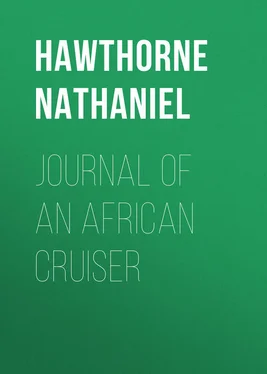Nathaniel Hawthorne - Journal of an African Cruiser
Здесь есть возможность читать онлайн «Nathaniel Hawthorne - Journal of an African Cruiser» — ознакомительный отрывок электронной книги совершенно бесплатно, а после прочтения отрывка купить полную версию. В некоторых случаях можно слушать аудио, скачать через торрент в формате fb2 и присутствует краткое содержание. Жанр: literature_19, foreign_antique, foreign_prose, на английском языке. Описание произведения, (предисловие) а так же отзывы посетителей доступны на портале библиотеки ЛибКат.
- Название:Journal of an African Cruiser
- Автор:
- Жанр:
- Год:неизвестен
- ISBN:нет данных
- Рейтинг книги:5 / 5. Голосов: 1
-
Избранное:Добавить в избранное
- Отзывы:
-
Ваша оценка:
- 100
- 1
- 2
- 3
- 4
- 5
Journal of an African Cruiser: краткое содержание, описание и аннотация
Предлагаем к чтению аннотацию, описание, краткое содержание или предисловие (зависит от того, что написал сам автор книги «Journal of an African Cruiser»). Если вы не нашли необходимую информацию о книге — напишите в комментариях, мы постараемся отыскать её.
Journal of an African Cruiser — читать онлайн ознакомительный отрывок
Ниже представлен текст книги, разбитый по страницам. Система сохранения места последней прочитанной страницы, позволяет с удобством читать онлайн бесплатно книгу «Journal of an African Cruiser», без необходимости каждый раз заново искать на чём Вы остановились. Поставьте закладку, и сможете в любой момент перейти на страницу, на которой закончили чтение.
Интервал:
Закладка:
The high hills that surround the city of Las Palmas are composed of soft stone, the yielding quality of which has caused these cliffs to be converted to a very singular purpose. The poorer people, who can find no shelter above ground, burrow into the sides of the hill, and thus form caves for permanent habitation, where they dwell like swallows in a sand-bank. Judging from the number of these excavations, the mouths of which appear on the hill-sides, there cannot be less than a thousand persons living in the manner here described. Not only the destitute inhabitants of Grand Canary, but vagabonds from Teneriffe and the other islands, creep thus into the heart of the rock; and children play about the entrances of the caverns as merrily as at a cottage-door: while, in the gloom of the interior, you catch a glimpse of household furniture, and women engaged in domestic avocations. It is like discovering a world within the world.
CHAPTER II
Nelson's defeat at Santa Cruz – The Mantilla – Arrival at Porto Grande – Poverty of the inhabitants – Portuguese Exiles at the Cape de Verds – City of Porto Prayo – Author's submersion – Green Turtle – Rainy Season – Anchor at Cape Mesurado.
July 1. – Ashore at Santa Cruz. The population of the city is reckoned at six or eight thousand. The streets are clean, and the houses built in the Spanish fashion. Camels are frequent in the streets.
The landing at the Mole is generally bad, as Nelson found to his cost. It is easy to perceive that, even in ordinary times, the landing of a large party, though unopposed, must be a work of considerable difficulty. How much more arduous, then, was the enterprise of the great Naval Hero, who made his attack in darkness, and in the face of a well-manned battery, which swept away all who gained foot-hold on the shore! The latter obstacle might have been overcome by English valor, under Nelson's guidance; but night, and the heavy surf, were the enemies that gave him his first and only defeat. The little fort, under whose guns he was carried by his step-son, after the loss of his arm, derived its chief interest, in my eyes, from that circumstance. The glory of the great Admiral sheds a lustre even upon the spot where success deserted him. In the Cathedral of Santa Cruz are to be seen two English flags, which were taken on that occasion, and are still pointed out with pride by the inhabitants. I saw them five years ago, when they hung from the walls, tattered and covered with dust; they are now enclosed in glass cases, to which the stranger's attention is eagerly directed by the boys who swarm around him. The defeat of Nelson took place on the anniversary of the patron-saint of Santa Cruz; a coincidence which has added not a little to the saint's reputation. It was by no means his first warlike exploit; for he is said to have come to the assistance of the inhabitants, and routed the Moors, when pressing the city hard, in the olden time.
We wandered about the city until evening, and then walked in the Plaza. Here the ladies and gentlemen of the city promenade for an hour or two, occasionally seating themselves on the stone benches which skirt the square. Like other Spanish ladies, the lovely brunettes of Santa Cruz generally wear the mantilla, so much more becoming than the bonnet. There are just enough of bonnets worn by foreigners, and travelled Spanish dames, to show what deformities they are, when contrasted with the graceful veil. This head-dress could only be used in a climate like that of Teneriffe, where there are no extremes of heat or cold. It is a proverb that there is no winter and no summer here. So equable and moderate is the temperature, that, we were assured, a person might, without inconvenience, wear either thick or thin clothing, all the year round. With such a climate, and with a fertile soil, it would seem that this must be almost a Paradise. There is a great obstruction, however, to the welfare of the inhabitants, in the want of water. It rains so seldom that the ground is almost burnt up, and many cattle actually perish from thirst. It is said that no less than thirty thousand persons have emigrated from the island, within three years.
The productions of Teneriffe, for export, are wine and barilla. Of the first, the greater part is sent to England, Russia and the United States. About thirty thousand pipes are made annually, of which two thirds are exported. Little or no wine is produced on the southern slope of the island. The hills around Santa Cruz are little more than rugged peaks of naked rock. The scenery is wild and bold, but sterile; and scattered around are stupendous hills of lava, the products of former volcanic eruptions, but which have, for ages, been cold and wave-washed.
14. – Arrived at Porto Grande, in the island of St. Vincent's, one of the Cape de Verds. The harbor is completely landlocked by the island of St. Antonio, which stretches across its mouth. Still, there is, at times, a considerable swell. The appearance of the land is barren, desolate, and unpromising in the highest degree; and the town is in keeping with the scenery. Eighty or ninety miserable hovels, constructed of small, loose stones, in the manner of our stone-fences, stand in rows, with some pretence of regularity. Besides the Governor and his aid, there are here five white men, or rather Portuguese (for their claim to white blood is not apparent in their complexions), viz. the Collector, the American Consular Agent, a shop-keeper, whose goods are all contained in a couple of trunks, and two private soldiers. We called to see the Governor, and were politely received; he offered seats, and did the honors of the place with dignity and affability. His pay is one dollar per diem. He has five soldiers under his command, two of them Portuguese, and three native negroes, one of whom has a crooked leg.
The people here are wretchedly poor, subsisting chiefly by fishing, and by their precarious gains from ships which anchor in the port. The Collector informed me that there had been sixty whale-ships in the harbor, within the past year. The profits accruing from thence, however, are very inadequate to the comfortable support of the inhabitants. The adults are mostly covered with rags, while many of the children are entirely naked; the cats and dogs (whose condition may be taken as no bad test of the degree of bodily comfort in the community) are lean and skeleton-like. As to religion, I saw nothing to remind me of it, except the ruins of an old church. There has been no priest since the death of one who was drowned, a few years ago, near Bird Island, a large rock, at the mouth of the harbor. At the time of this fatal mishap, the reverend father was on a drunken frolic, in company with some colored women.
The Cape de Verd Islands derive their name from the nearest point of the mainland of Africa; they are under the dominion of Portugal, and, notwithstanding their poverty, furnish a considerable revenue to that country, over and above the expenses of the Colonial Government. This revenue comes chiefly from the duties levied upon all imported articles, and from the orchilla trade, which is monopolized by the Government at home, and produces 50,000 dollars per annum. Another source of profit is found in the tithes for the support of the Church, which, in some, if not all the islands, have been seized by the Government (under a pledge for the maintenance of the clergy), and are farmed out annually. These islands supply the Portuguese with a place of honorable exile for officers who may be suspected of heresy in politics, and hostility to existing institutions. They are advanced a step in rank, to repay them (and a poor requital it is) for the change from the delicious climate of Portugal, and the gaieties of Lisbon, to the dreary solitude, the arid soil, and burning and fever-laden air of the Cape de Verds. It is a melancholy thought, that many an active intellect – many a generous and aspiring spirit – may have been doomed to linger and perish here, chained, as it were, to the rocks, like Prometheus, merely for having dreamed of kindling the fire of liberty in their native land.
Читать дальшеИнтервал:
Закладка:
Похожие книги на «Journal of an African Cruiser»
Представляем Вашему вниманию похожие книги на «Journal of an African Cruiser» списком для выбора. Мы отобрали схожую по названию и смыслу литературу в надежде предоставить читателям больше вариантов отыскать новые, интересные, ещё непрочитанные произведения.
Обсуждение, отзывы о книге «Journal of an African Cruiser» и просто собственные мнения читателей. Оставьте ваши комментарии, напишите, что Вы думаете о произведении, его смысле или главных героях. Укажите что конкретно понравилось, а что нет, и почему Вы так считаете.












